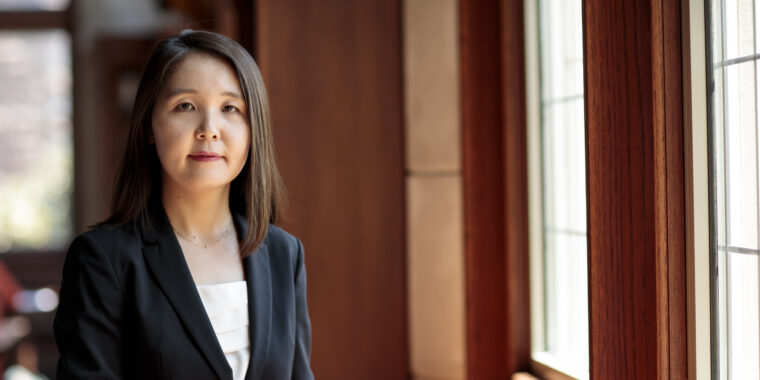Testifying on U.S. gun violence in Bogota, Colombia. Presenting on privacy in the digital age. Writing a dissertation on clinical whole-genome sequencing data. Making the dean’s list.
All in a day’s work for Jiyeon Kim, who will graduate this month from Washington University in St. Louis with a doctor of law degree from the School of Law and who plans a career focused on health and technology law and policy.
 Kim, who was born in Daegu, South Korea, and also lived in London as a child, earned a master’s degree in medical law and ethics, with distinction, from the Dickson Poon School of Law at King’s College London.
Kim, who was born in Daegu, South Korea, and also lived in London as a child, earned a master’s degree in medical law and ethics, with distinction, from the Dickson Poon School of Law at King’s College London.
The program provided her with more comparative and international perspectives on health and tech policy and law.
In working on her dissertation on legal and policy issues involving clinical whole-genome sequencing data, she collaborated with researchers involved in the U.K.’s 100,000 Genomes Project.
“This memorable time in London solidified my passion for solving the problems in health law and policy,” Kim said. “As I considered the next steps, I knew I wanted to make sure I had a firm background and comprehensive knowledge of the legal system — law school was the logical next step.”
Making the most of law school
Once she decided she wanted to attend law school, Washington University was immediately at the top of Kim’s list.
She had already collaborated with researchers here and had heard of a plan for a new interdisciplinary institute between the School of Law and Washington University School of Medicine to tackle critical issues at the intersection of law and medicine, which is now The Cordell Institute for Policy in Medicine & Law.
“I have been fortunate to be a junior fellow of the institute,” she said, citing collaboration with co-directors Neil Richards, the Koch Distinguished Professor of Law, and Jonathan W. Heusel, MD, PhD, professor of pathology and immunology and of genetics at the School of Medicine. “Among my work with the institute, I’m excited to be a co-author of an article analyzing the privacy risks and harms of direct-to-consumer genetic testing, such as 23andMe and Ancestry, which will be published in the Washington University Law Review.”
She also joined the research initiative at the Whitney R. Harris World Law Institute at the School of Law, led by Leila Sadat, the James Carr Professor of International Criminal Law, examining the U.S. gun violence epidemic as a human rights violation under international law.
In February 2018, she testified on behalf of the Harris Institute at the Inter-American Commission on Human Rights 167th Period of Sessions hearing on the “Regulation of Gun Sales and Social Violence in the United States” in Bogota, Colombia, alongside other organizations: Amnesty International, the Center for American Progress and Igarapé Institute.
“It was a thrilling, and somewhat nerve-racking, experience to testify at such an international platform, especially against the United States government,” she said. “The most memorable part was the amazing experience working with representatives from the other organizations. We had a very intense work meeting the day before our hearing and managed to create a sequence of testimonies that emphasized the unique strengths and efforts of each organization while giving the effect of a united front on this important issue.”
She continued the work after she got home, publishing a brief addressing gun violence in Missouri.
During her time at the law school, Kim has also been on the editorial board of the Washington University Law Review, a member of the Dean’s Student Advisory Council and chair of the annual musical showcase committee for the law school community. She has consistently been on the school’s dean’s list.
“I was extremely fortunate to meet great friends and colleagues during my time in law school,” she said. “Through many prior experiences, I believe that I have gained more perspective that has enabled me to value people and friendships and cherish moments in life. I am honored to have been a part of such a great community like WashU law and I look forward to lifelong friendships and connections.”
Following graduation, Kim will continue policy research and work in Washington, D.C., focusing on health and tech law and policy. She is interested in the issue of regulating technology in health care as it relates to data privacy, ethics and regulation.
“I hope to continue to be engaged in the issue of improving equality in and access to health care with the introduction of new technology and service models and the dawn of the personalized medicine era,” she said.
